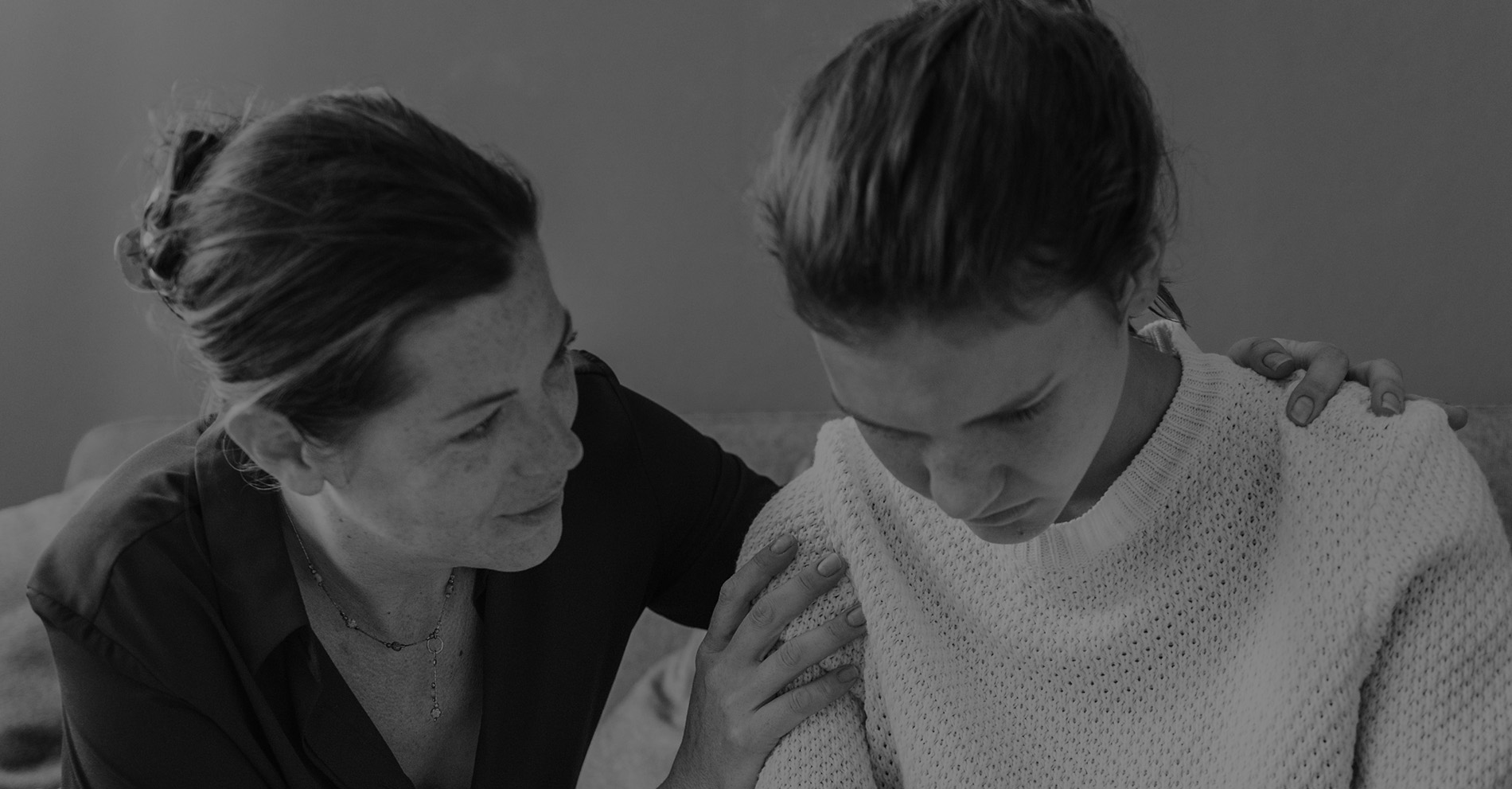Almost one-third of U.S. adolescents will meet the criteria for an anxiety disorder by the age of 18. Here’s how to recognize anxiety in your teen.
Anxiety is our body’s way of letting us know that something isn’t right. It signals to our nervous system that it’s time to move into high alert and give our surroundings our full attention. It’s a natural physiological response to stress, danger, or a threat, and usually disappears when the threat goes away.
Experiencing anxiety is a normal part of life. But when someone experiences persistent, excessive fear when there’s no threat or danger present, or their anxiety or nervousness is out of proportion to the situation to the point it interferes with their daily activities, they might be suffering from an anxiety disorder.
YOU ARE NOT ALONE >
Did you know anxiety disorders are the most common mental health disorder in the U.S., with 42.5 million people experiencing anxiety disorder a year?
Anxiety disorders are the most common mental health disorder in the United States: 42.5 million people experience an anxiety disorder in any given year. They’re also the most common type of mental health disorder in children and teens.
According to the National Institute of Mental Health, 31.9 percent of American adolescents — nearly a third — will meet the criteria for an anxiety disorder by the age of 18. (Research shows that girls are more likely to suffer from anxiety disorders than boys.)
Anxiety Symptoms in Teens
In pre-teens and teens, anxiety can show up as anxious feelings, fear, excessively worrying, anger, and irritability. Some physical symptoms of anxiety include digestive issues, headaches, and sleep problems. Since anxiety disorders can worsen over time, it’s important to understand the different types of disorders, what they might look like, and how you can help.

The Most Common Types of Anxiety in Teens
There are many types of anxiety disorders, and they affect people in different physical and psychological ways. Here are some of the most common types and how they might manifest in teens.
Generalized Anxiety Disorder (GAD)
This is characterized by intense worry or fear about aspects of daily life, like relationships, friends, school, etc. Teens suffering from GAD often worry about the future, worry about their grades and how they’ll perform in school, or worry about the health of family members.
Panic Disorder
Panic disorder is characterized by recurrent panic attacks — periods of intense fear that can be as short as a few minutes or as long as a few hours, and come seemingly out of nowhere.
During a panic attack, a person may worry that they’re dying; their heart might race, they may find it hard to breathe, and they may experience chest pains and feel dizzy or faint.

Ready to elevate your parenting? Become a member of the BLOOM family today!
Gain access to workshops, coaching, and a network of supportive parents. Don’t navigate this journey alone –
Specific Phobias
Phobias are the excessive and irrational fear of specific objects or situations that are usually not harmful: darkness, bugs, crowds, flying, being in an elevator, etc.
Social Anxiety Disorder
While many teens might feel anxious about new or unfamiliar social situations of social activity, teens suffering from social anxiety disorder experience debilitating fear — especially around the possibility of being humiliated or rejected in public, or of being publicly embarrassed. The National Institute of Mental Health estimates that 9.1 percent of teens experience social anxiety disorder at any given time.
Pre-teens and teens often compare themselves to their peers, and the media and social media can make those comparisons worse: They feed the illusion that other people “have it all together” and perhaps don’t struggle with the same fears and anxieties that might plague your teen. It might help to let them know that they’re not alone and that anxiety is incredibly common in general, and especially so during adolescence.

9 Ways to Help Your Teen Handle Anxiety
If you’re worried that your preteen or teen is overly anxious, here are some ways to support them at home.
1. Start Meditating
For 2500 years, meditation has helped people manage their anxiety. If you have a meditation practice, offer to teach them (but don’t push it if they’re not interested!).
If you don’t meditate, offer to learn with them. Apps like Insight Timer, Headspace, and Calm offer short, step-by-step guided practices for beginners.
Read more about how to boost your self-confidence through meditation.
2. Break a Sweat
Aerobic activities like running, dance, tennis and basketball can help metabolize intense emotion.
3. Move Mindfully
Slower physical practices that focus on the breath, like yoga, qi gong or tai chi, can foster connection between mind and body, helping teens who are feeling overwhelmed feel more in control and self-aware.
4. Go Outside
Nature can be instantly calming and remind teens of something larger than themselves. Suggest hiking, walking the dog, walking in a local park, even learning to garden — anything that combines movement with the soothing power of the natural world.
5. Write it Out
Gift them a blank journal that fits their personality — maybe a fun and maximalist cover, or one with a simple minimalist design — and suggest they spend a few minutes every morning writing out their fears and worries, concerns, or whatever they need to get down on paper. Make it clear that their writing will never be seen by anyone else.
6. Remove any Triggers
An overstimulated nervous system can lead to, or worsen, adolescent anxiety. Cutting out or cutting back on any powerful stimulants in their system, like caffeine and energy drinks, can make a huge difference in anxiety levels.
7. Get Back to Basics
Are they drinking enough water? Sleeping? Eating healthy meals? These might seem unexciting — but hydration, rest, and a balanced diet are all integral to a calm nervous system.
8. Promote Self-Expression
Artistic interests that serve as an outlet for self-expression, like music, art, poetry, can put them in touch with their inner world. Hobbies in general can help, whether they’re expressive or not.
Did you know that helping promote an outlet for self-expression can help build healthy self-esteem in preteens and teens? Read more about building self-esteem in teens.
9. Begin a Gratitude Practice
Suggest they write down three things they’re grateful for every night before bed. If they scoff at this, offer the science behind it: Over the past decade, the positive power of gratitude has been proven time and again by countless research studies. The brain cannot worry and think positively at the same time. It’s just not wired for it.
Treatment for Anxiety: When to Seek Professional Help
If their anxiety lasts more than six months, is excessive, and interferes with their daily life, it’s time to make an appointment with a mental health counselor or psychologist.
A therapist will help create a plan for treating anxiety, which might include cognitive behavioral therapy, a type of therapy that focuses on changing unhelpful thought patterns and is particularly effective with anxiety.

Additional Resources to Help With Anxiety in Teens
If you need help supporting someone with symptoms of anxiety, BLOOM has put together a list of resources to help your friend or family member.
Suicide/Crisis Support Hotline: 1 (800) 273‑TALK (8255)
Or text the Crisis Text Line – “HELLO” to 741741
Covenant House Teen Hotline: 1(800) TLC-TEEN (852-8336)
1-310-855-HOPE (4673) or text “TEEN” to 839863
Boys Town National Hotline: 1 (800) 448-3000
This hotline is for all teenagers struggling with anxiety. It’s available 24/7.
Panic Disorder Information Hotline: 1 (800) 647-2642
SAMHSA’s National Helpline: 1 (800) 662-4357
This helpline is a free, confidential, 24/7, treatment referral and information service for individuals and families facing mental and/or substance disorders.
Teen Tribe: This website provides peer-to-peer group support for teens who go through challenging times. This is a free service. https://support.therapytribe.com/teen-support-group/
ADAA Directory: This website allows teens and family members to search support groups in their local area, as well as phone or online groups. https://adaa.org/supportgroups
*If you or someone you know needs help, call the National Suicide Prevention Lifeline at 988. You can also reach a crisis counselor by messaging the Crisis Text Line at 741741.
Parenting can leave you feeling overwhelmed and alone, but at BLOOM you have a community ready to help. Access Live and On-Demand Workshops featuring our trusted experts. Get answers to your pressing questions through our Ask the Expert Platform. Find strength by joining our Community Group and connecting with fellow parents and caregivers. If you need more tailored support, take advantage of our 1-on-1 Parent Coaching Sessions. Raising tweens and teens is hard, but with BLOOM by your side, you don’t have to do it alone.
